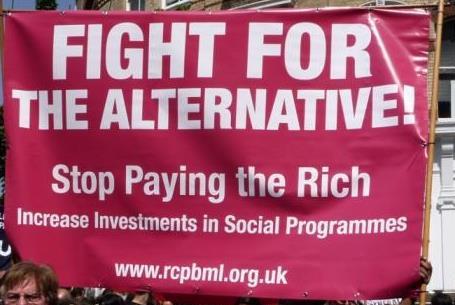
 |
||||
|---|---|---|---|---|
| Volume 55 Number 14, June 21, 2025 | ARCHIVE | HOME | JBCENTRE | SUBSCRIBE |
Spending Review 2025

On Wednesday, June 11, Chancellor of the Exchequer Rachel Reeves delivered her Spending Review 2025 [1] to the House of Commons, outlining how the Labour government intends to allocate government spending across departments over the rest of the term of this Parliament. What was so striking about the Chancellor's speech was her claim that the Review was to make "working people in all parts of our country better off, to rebuild our schools and our hospitals, and to invest in our economy". This is an illusion promoted in order to try and keep working people on-side. Reeves wove fraudulent arguments throughout her presentation designed to try and make this conclusion convincing. The reality, however, is that the verbiage about "national" and "economic" renewal as a real uplift in immediate investment "to grow our economy" was actually heavily focused on "defence spending" and "intelligence agencies". Although Reeves spoke about industrial infrastructure, such as steel, transport and nuclear energy, she emphasised that it was in support of "our defence capability". In other words, it was not in the direction of peace and prosperity at home and abroad but rather in the interests of the ruling elite to wage wars and interfere in other countries for their own narrow interests. The government is seeking to continue and step up its belligerent and interventionist role. It is aiming that its striving for domination on the coattails of the US, which demands to be recognised as the world's "indispensable nation", should continue unabated and unchallenged.

Caption text here
Reeves tried to set the scene of the UK's financial priorities, first of all focusing on her self-proclaimed "fiscal rules". Her first rule was of economic "stability: day-to-day Government spending should be paid for through tax receipts." So this was nothing new and nor was the promised increased annual growth in departmental budgets a year of 2.3% which she dressed up to look good. She said she was setting "out in the Budget, to allocate £190 billion more to the day-to-day running of our public services over the course of this spending review [the term of Parliament] compared with the previous Government's plans." However, this increase only amounted to her claim to address the very low bar indeed of a massive reduction in funding of public services by the 2010 Coalition government. But her Spending Review of claiming to increase departmental budgets annually by 2.3% neither matched, nor addressed both the real inflationary pressures, or the necessary investments in any restoration let alone "economic renewal" of health and other public services today.
The Chancellor then said that "my second fiscal rule enables me" to invest in "Britain's economic renewal while getting public debt on a downward path". It was this pay-the-rich rule to please the financial oligarchy that she claimed allowed her to increase "public investment" by more than £100 billion in the autumn and a further £13 billion in the spring. These immediate investment plans were "investment to rebuild our transport networks, our defence capability and our energy security" and claimed that this would "in short grow our economy". The mendacity is that this is intended to ensure that "economic renewal is felt in people's lives", when really such investment is aimed at funding the transport company infrastructure, energy sector including a new nuclear power station costing £14 billion for Sizewell C, with £2.5 billion for a new small modular reactor programme, and massively expanding the armament industry.
The whole Spending Review presented by the Chancellor omitted to mention the reality that Britain's economy is in deep crisis and that is what is "being felt in people's lives". No, Reeves underlying concern is to bolster Britain's "war-ready economy" and facilitate executive rule. As the review was announced, according to the Office for National Statistics (ONS) [2] the early estimate of pay-rolled employees for May 2025 (mainly in the service sector but also manufacturing) decreased by a staggering 109,000 (0.4%) on the month and decreased by 274,000 (0.9%) on the year to 30.2 million. These latest figures are a deepening of the trend of increased unemployment within the UK. The unemployment rate for people aged 16 years and over is estimated at 4.6% in February to April 2025. ONS point out that "this is above estimates of a year ago, and up in the latest quarter".
Yet defence spending in this "economic renewal" will "now rise to 2.6% of GDP by April 2027, including the contribution of our intelligence agencies". That uplift provides "an £11 billion increase in defence spending and a £600 million uplift for our security and intelligence agencies." The Chancellor claimed that this investment will deliver not only "security", but "renewal" in Aldermaston and Lincoln; in Portsmouth and Filton; on the Clyde and in Rosyth. "Investment in Scotland, jobs in Scotland, and defence for the United Kingdom."

This is in line with Keir Starmer's speech of March 13 in which he elaborated Labour's plan for "Change". The central theme of this plan is that it will enable "active government" so as to achieve its goals of "national security" and "national renewal". Under the signboard of "enhancing effectiveness and efficiency", the reforms are directed to enabling both the state and private interests to operate unfettered by regulatory constraint. This was also the significance of abolishing NHS England, and putting the health service under the control of the Executive.
Furthermore, in line with the government's attempt to put Britain on "war-fighting readiness" in the Strategic Defence Review [3] announced last week, the Chancellor repeated the justification of the Prime Minister that the aim of "national" and "economic" renewal was a real uplift in investment that focuses on "security" and "defence spending".
This direction for the economy outlined in the Spending Review 2025 is not about security for the British people and certainly not about peace. Militarisation of an economy only leads to further insecurity and war. The unprecedented growth of military industries itself has become a huge lobby to lead the government in their wars that they are already deeply involved in abroad. Today it already drives Britain's military participation in and support for the genocide in Israel against the Palestinians. It is continuing to supply the Israelis with British-manufactured weapons in launching their criminal bombing of Iran. It has supported the Saudi bombing of Yemen for over a decade and now more recently alongside the US directly criminally bombing Yemen as well. It is also these war industries that are demanding that NATO's proxy war in Ukraine continue to the "last Ukrainian" against Russia so that they can continue to produce the weapons that fuel the war and huge profits.
At the same time, such a war economy also has ruinous effects on the economic and financial life of the country. As we have seen over the last months, the huge increase in unemployment in Britain and the increasing insecurity of the livelihoods of the people will not be addressed by the so-called new jobs in the war industries, or in aiming the energy, steel and transport industries at war preparations. Quite the opposite. The weapons produced do not go into circulation in the economy and neither does the energy, steel and transport resources used to produce them. The massive military spending contributes to the soaring government deficit, which the government seeks to pay off by issuing more digital and paper currency as well as through raising taxes, cutting back on services, and so on. Unemployment and inflation are disproportionally created, with "too many pounds chasing too few goods and services".
In summary, the main aim of the Spending Review is not about "defence" or "security" for the British people but to take Britain in the direction of a war-ready economy for the criminal interests of the ruling elite and their ambitions to conquer markets abroad and destroy other countries that they cannot control. This cannot be accepted. Workers' Weekly calls on the whole working class and people's movements to be vigilant and step up the fight in defence of the rights of all and for people's empowerment in these circumstances. Economic renewal will only be served by people speaking out in their own name and in their collectives for all that serves their own interests for peace and real economic and national security. Reject the government's plan to dress-up the direction to a war economy as "renewal" of the economy!
Notes
1. Spending Review 2025, Volume 768: debated on Wednesday 11 June 2025
https://hansard.parliament.uk/commons/2025-06-11/debates/AA2E816F-02F9-4C3A-920A-BAFEDF4B422E/SpendingReview2025
2. Labour market overview, ONS UK: June 2025
https://www.ons.gov.uk/employmentandlabourmarket/peopleinwork/employmentandemployeetypes/bulletins/uklabourmarket/june2025
3. Strategic Defence Review: Starmer's Attempt to Put Britain on
"War-Fighting Readiness" Cannot Be Accepted, Workers' Weekly
June 7 2025
https://www.rcpbml.org.uk/wwie-25/ww25-13/ww25-13.htm